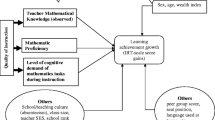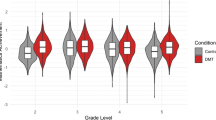Abstract
Recent international comparisons show that themathematics achievement of American students is belowthe international average. In response to thissituation, the present study compared first-year college students enrolled in remedial-type mathematicscourses with their counterparts enrolled in nonremedialcoursework. Findings include that students enrolled innonremedial mathematics courses enter the institution with many advantages over students enrolled inremedial mathematics. Tests of a path analytic modelconfirmed that background variables play a major role indetermining success in college mathematics.
Similar content being viewed by others
REFERENCES
Adelman, C. (1995). National Institute on Postsecondary Education, Libraries, and Lifelong Learning. The New College Course Map and Transcript Files: Changes in Course Taking and Achievement, 1972-1993. Washington, DC: Office of Educational Research and Improvement.
Andrews, J. V. (1989). Attitudes and beliefs about mathematics: Do parents, students, teachers, counselors, and principals agree? Paper presented at the annual meeting of the American Educational Research Association, San Francisco, CA.
Apling, R. N. (1993). Proprietary schools and their students. Journal of Higher Education64: 379-416.
Ascher, C. (1983). Improving the Mathematical Skills of Low Achievers. ERIC Clearinghouse on Urban Education. New York: National Assessm ent of Educational Progress (ERIC Document Reproduction Service No. ED 237 584).
Astone, N. M., and McLanahan, S. S. (1991). Family structure, parental practices and high school completion. American Sociological Review56(3): 309-320.
Becker, B. J. (1990). Item characteristics and gender differences on the SAT-M for mathematically able youths. American Educational Research Journal27: 65-87.
Benbow, C. P. (1988). Sex differences in mathematical reasoning ability in intellectually talented preadolescents: Their nature, effects, and possible causes. Behavioral and Brain Sciences11(2): 169-183.
Blosser, P. E. (1990). Procedures to Increase the Entry of Women in Science-R elated Careers. ERIC/SMEAC Science Education Digest No. 1. Columbus: The Ohio State University (ERIC Document Reproduction Service No. ED 321 977).
Bourque, M. L,. and Garrison, H. H. (1991). The Levels of Mathematics Achievement: Initial Performance Standards for the 1990 NAEP Mathematics Assessment(ERIC Reproduction Service No. ED 342 685).
Briscoe, D. Associated Press Report (1995, July 5). Schools seen as failure in preparing for jobs. Chicago Sun-Timesp. S29.
Brophy, J. (1986). Research linking teacher behavior to student achievement: Potential implications for instruction of Chapter 1 students. Paper presented at the Designs for Compensatory Education Conference, Washington, D.C., June 1986 (ED 293 914).
Campbell, P. B. (1986). What' s a nice girl like you doing in a math class? Phi Delta Kappan67(7): 516-520.
Cipra, B. (1993). An awesome look at Japan' s math SAT. Science259(5071): 22.
Dossey, J. A., Malachuk, O., Shure, P., Burkam, D., Gurin, P., Hollenshead, C., Lewis, D. J., Soellner-Younce, P., Neal, H., and Davis, C. (1988). Mathematics: Are We Measuring Up? The Mathematics Report Card, Executive Summary. Office of Educational Research and Improvment, Washington, DC (ERIC Reproduction Service No. ED 300 207).
Ehrhart, J. K., and Sandler, B. R. (1987). Looking for More Than a Few Good Women in Traditionally Male Fields. Washington, DC: Project on the Status and Education of Women, Association of American Colleges.
Fadem, B., Schuchman, M., and Simring, S. S. (1995). The relationship between parental income and academic performance of medical students. Academic Medicine70(12): 1142-1144.
Feingold, A. (1988). Cognitive gender differences are disappearing. American Psychologist43: 95-103.
Fulton, J. D. (1996). 1995 annual AMS-IMS-MAA Survey (second report). Notices of the American Mathematical Society43(8): 849-858.
Gibbs, G. (1995). Promoting excellent teaching is harder than you' d think. Change27(3): 16-20.
Grissmer, D. W., Kirby, B., Berends, M., and Williamson, S. (1994). Student Achievement and the Changing American Family. Santa Monica, CA: RAND Institute on Education and Training.
Hagedorn, L. S., Siadat, M.V., Nora, A., and Pascarella, E. T. (1997). Factors leading to gains in mathematics during the first year in college: An analysis by gender and ethnicity. The Journal of Women and Minorities in Science and Engineering3(3): 185-202.
Hancock, L., and Wingert, P. (1995). The mixed report card. Newsweek126(20): 69.
Hein, C., and Lewko, J. H. (1994). Gender differences in factors related to parenting styles: A study of high performing science students. Journal of Adolescent Research9(2): 262-281.
Hewitt, N. M., and Seymour, E. (1991). Factors Contributing to High Attrition Rates Among Science, Mathematics, and Engineering Majors: Summary of Findings from the Phase One Study. New York: The Alfred P. Sloan Foundation.
International Association for the Evaluation of Education Achievement (1987). The Underachieving Curriculum: Assessing U.S.School Mathematics from an International Perspective. Champaign, IL: Stipes Publishing Company.
Jacobs, J., and Eccles, J. (1985). Gender differences in math ability: The impact of the media reports on parents. Educational Researcher14(3): 20-25.
Kamii, M. (1990). Opening the algebra gate: Removing obstacles to success in college prepatory mathematics courses. Journal of Negro Education59(3): 392-406.
Kozol, J. (1991). Savage Inequalities: Children in America's Schools. New York: Crown.
Mansfield, W., Farris, E., and Black, M. (1991). College-Level Remedial Education in the Fall of 1989.National Center for Education Statistics. U.S. Departm ent of Education, Office of Educational Research and Improvement.
Manzo, K. K. (1994). SAT scores continue recent trends. Black Issues in Higher Education11(1): 11.
Melange: Superconductor supercollider and a final theory in physics: Self segregation of black students: The mathematics pipeline (1988, May 6). Chronicle of Higher Education, p. 49.
Pascarella, E. T., Whitt, E. J., Edison, M. I., Nora, A., Hagedorn, L. S., and Yeager, P. M. (1997). The ª chilly climateº for women and cognitive outcomes during the first year of college. Journal of College Student Development, 38, 109-124.
Payzant, E. J., and Wolf, D. P. (1993). Piloting pacesetter: Helping at-risk students meet high standards. Educational Leadership50(5): 42-45.
Pursuing Excellence: A Study of U.S.Eighth Grade Mathematics and Science Teaching, Learning, Curriculum, and Achievement in International Context. Conclusions (1996). http://www.ed.d gov/NCES/TIMSS/97198-9.htm l.
Report card: Try harder (1991, October 14). U.S.News & World Report111(16): 18.
Russell, R. L., and Ginsburg, H. (1980, April). The mathematical thinking of poor inner city children. Paper presented at the Southeastern Conference on Human Development, Alexandria, VA (ERIC Document Reproduction Service No. ED 191 724).
Sagher, Y., and Siadat, M. V. (1997) Building study and work skills in a college mathematics classroom. Unpublished manuscript, University of Illinois at Chicago.
Sax, L. J. (1994). Mathematical self-concept: How college reinforces the gender gap. Research in Higher Education35(2): 141-166.
Sax, L. J., and Antonio, A. L. (1995, April). Twenty-five years of gender differences in freshman self-concepts and aspirations: Convergence or divergence? Paper presented at the annual meeting of the American Educational Research Association, San Francisco, CA.
Stage, F. K., and Kloosteman, P. (1995). Gender, beliefs, and achievem ent in remedial college-level mathematics. Journal of Higher Education66(3): 294-311.
Tack, M. W., and Patitu, C. L. (1992). Faculty Job Satisfaction: Women and Minorities in Peril. (ASHE-ERIC Higher Education Report No. 4). Washington, DC: The George Washington University, School of Education and Human Development.
Tarvis, C. (1992). The Mismeasure of Women. New York: Touchstone.
Teachman, J. D. (1996). Intellectual skills and academic performance: Do families bias the relationship? Sociology of Education69(1): 35-48.
Waits, B. K., and Demana, F. (1988). Relationship between mathematics skills of entering students and their success in college. School Counselor35(4): 307-310.
Waxman, H. C., and Padron, Y. N. (1995). Improving the quality of classroom instruction for students at risk of failure in urban schools. Peabody Journal of Education70(2): 44-65.
Weiss, K. R. (1997, March 20). Many Cal State freshm en lack math, English skills. Los Angeles Times, pp. A3, A17.
Wieschenberg, A. A. (1994). Overcoming conditioned helplessness in mathematics. College Teaching42(2): 51-54.
Zeidner, M. (1990). Does test anxiety bias scholastic aptitude test performance by gender and sociocultural group? Journal of Personality Assessment55: 145-160.
Ziomek, R. L., and Maxey, E. J. (1995). Are our high school graduates prepared in mathematics and science? NSSP Bulletin79(571): 102-110.
Rights and permissions
About this article
Cite this article
Hagedorn, L.S., Siadat, M.V., Fogel, S.F. et al. SUCCESS IN COLLEGE MATHEMATICS: Comparisons Between Remedial and Nonremedial First-Year College Students. Research in Higher Education 40, 261–284 (1999). https://doi.org/10.1023/A:1018794916011
Issue Date:
DOI: https://doi.org/10.1023/A:1018794916011




